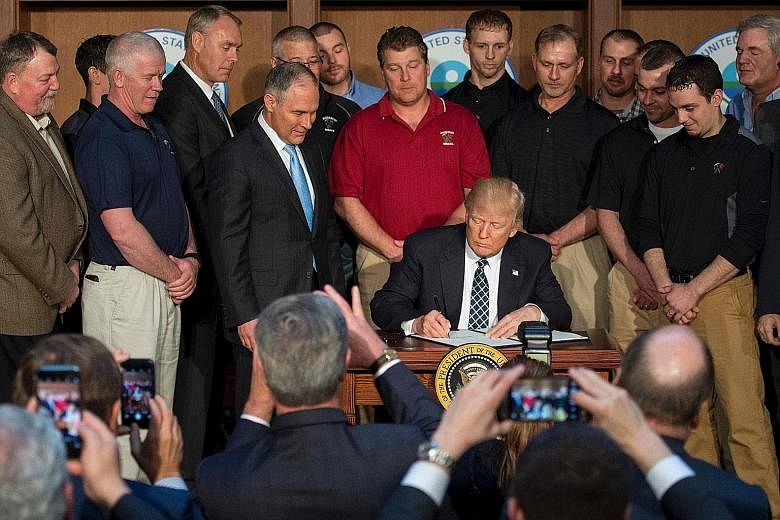WASHINGTON • United States President Donald Trump's executive order rolling back predecessor Barack Obama's signature global warming measure stopped short of withdrawing from the historic Paris climate accord - but has already raised international concerns about whether the US will now do its share to fight the global threat.
Europe's top climate official, European commissioner Miguel Arias Canete, expressed "regret" about Mr Trump's executive order rolling back what he called the "main pillar" of US climate policy, the Clean Power Plan, in a statement to the Washington Post.
"Now, it remains to be seen by which other means the United States intends to meet its commitments under the Paris Agreement," said Mr Canete.
The words of Mr Canete, one of the most prominent global diplomatic figures yet to comment on Mr Trump's move, signal how the President's executive order eviscerating Mr Obama's climate plan is already raising international concerns, and further suggests that the country could be left isolated as other nations push forward to curb emissions.
-
The Trump plan
-
What does US President Donald Trump plan to do under his executive order rolling back measures to fight global warming? There are three main components:
• Dismantle the Clean Power Plan (CPP) advanced by the previous Barack Obama administration that would reduce carbon dioxide emissions from existing coal-burning power plants and limiting allowable carbon dioxide levels at new plants.
• Promote fossil fuel extraction in an effort to make American energy independent and to fulfil a campaign pledge to bolster the coal industry. As part of that effort, he will remove a moratorium on coal leasing by the government, allowing federal land to be used for coal mining.
• Strip consideration of the long-term effects of climate change from routine government decision-making.
WHAT COMES NEXT?
Mr Trump has asked a federal appeals court to halt its review of carbon emission rules for power plants.
He has asked to temporarily place on hold a 26-state suit challenging CPP - the centrepiece of Mr Obama's environmental agenda - so the new administration can dismantle it ahead of a ruling on its legality.
The request is the strong- est sign yet that the US may back away from Mr Obama's commitment to a 197-nation climate change accord, though the White House has not taken that step.
Asking the court to halt its review is the easy part; getting it to agree on next steps could be more difficult. Since the CPP was finalised, the new administration must go through the rule-making process again to undo it, said Villanova University law professor Todd Aagaard.
The Environmental Protection Agency will need about a year to administratively remove the CPP from the federal regulatory landscape, while justifying that reversal, allowing for public comment, and still meeting its obligations under existing air pollution laws.
The result will almost certainly be challenged by the same green groups and states that initially defended the rule.
WASHINGTON POST, BLOOMBERG
It is far from clear how the US will now be able to meet its commitments under the 2015 Paris agreement, in which more than 195 governments pledged to take actions to hold the planet's warming "well below" a danger zone of 2 deg C.
Those concerns about US climate commitments under a Trump presidency could come up in May, when diplomats gather for a working group meeting on the Paris Agreement.
The Paris Agreement depended on individual commitments from each country to reduce emissions. The Clean Power Plan, which Mr Trump's order seeks to rescind, was a core part of the US commitment to reduce its greenhouse gas emissions by 26 to 28 per cent below their 2005 levels by the year 2025.
The Trump order could also encourage other countries to backslide on their commitments - such as Brazil, another major global emitter, mainly because of deforestation.
Observers thought Mr Trump's order would be seen as a sign that the US is retreating from global climate leadership. "American leadership was critical to securing the Paris climate accord - but with that agreement in force, the rest of the world has embarked on a low-carbon path regardless of what Washington chooses to do," said Dr Nathaniel Keohane, who heads the global climate programme at the Environmental Defence Fund.
"If the US steps back, China will be happy to step forward."
The US could further lose influence as climate change becomes more and more central to negotiations between countries, said Mr David Waskow, director of the International Climate Initiative at the World Resources Institute.
"I think what will happen is that over time, countries will continue pressing forward, in venues like the G7 and the G20, and the United States will become more and more isolated if it doesn't get on board," he said.
WASHINGTON POST

